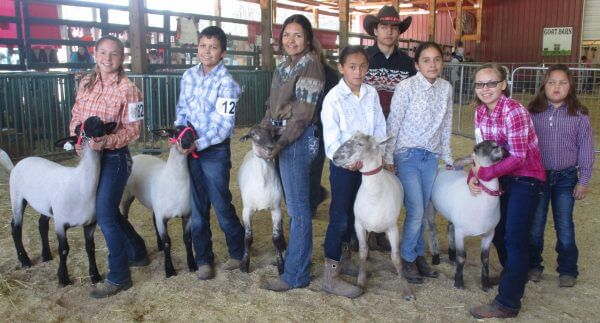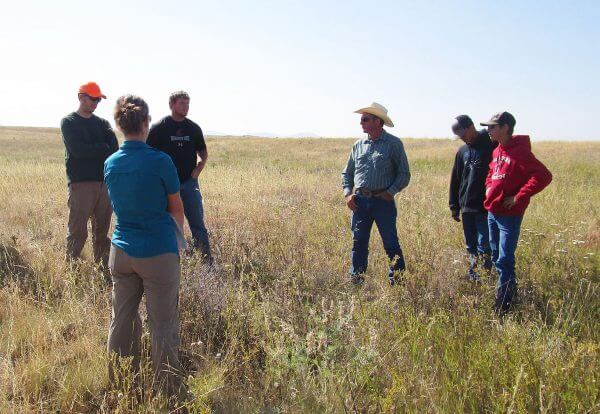Located in Central Washington, the Confederated Tribes of the Colville Reservation consists of 1.4 million acres and is composed of 12 bands: the Chelan, Chief Joseph Band of Nez Perce, Colville, Eniat, Lakes, Methow, Moses-Columbia, Nespelem, Okanogan, Palus, San Poil, and Wenatchi.
Activities

The Colville Reservation extension program’s goals are built around the unified strategy of providing cutting edge, research-based, diverse educational programming that meets the current and evolving needs of the community. The focus of the program is on 4-H Positive Youth Development, Family and Consumer Sciences, and Ag and Natural Resources. The program, which was the first self-directed tribal 4-H program in Washington state, continues to grow with the addition of food safety and food preservation, financial literacy, parenting education, as well as a wildfire threats program called ‘Be Ember Aware.’
Highlights
MEASURING IMPACT
-
“I think we’re very lucky to have [the agent] … I’m thankful for it as a veteran 4-H mother and I’ve been really pleased to see that some of the members that I was a leader for, have grown and utilized the things that they learned through that program in their daily lives now. Record keeping, responsibility for teaching your children life skills, and being willing to share their knowledge with others in the community.”
FRTEP programs have had a major impact on individuals, families and tribal communities. Just how much impact has now been quantified thanks to a research project that used Ripple Effects Mapping (REM) and content analysis. The Indian Land Tenure Foundation (ILTF) engaged in a joint collaboration with an evaluation team and the Western Extension Risk Management Education Center to measure the long-term impacts of the Federally Recognized Tribal Extension Program (FRTEP) serving the Colville Reservation. Click the link below to read the report.
4-H and youth programming
The Extension 4-H program has helped to implement and incorporate Native languages into programming, with the 4-H pledge having been translated into one of the Reservation’s three languages. 4-H enrollment and participation has continued to increase, with youth consistently receiving top honors at the county fair. In 2014, all of the Grand Champions, from all four species of 4-H animal projects, were from Colville 4-H. The Shooting Sports program has also received top honors along with livestock and still-life projects. The Colville 4-H program is the only one in the state of Washington to have taken part in all 4-H National Youth Science Day events since its inception in 2007. These activities have exposed Colville Reservation youth to cutting-edge science enrichment and STEM (Science, Technology, Engineering and Math) for many years.
 Family and Consumer Science
Family and Consumer Science
- Food preservation – Reliable information on food safety and food quality for community members who participate in home food preservation, an important and popular cultural activity.
- Food safety – Education for young people about germs to help them understand why hand washing is important before preparing food. Food safety instruction for older adults on the basics of food safety: clean, separate, cook and chill.
- Nutrition – Providing healthy recipes, nutrition information, gardening tips and food preservation information.
- Parenting – Positive Indian Parenting is a practical, culturally appropriate 8-week course to explore the values and attitudes expressed in traditional Indian child-rearing practices and to apply those values to modern parenting skills.
Food Sovereignty
As a result of food sovereignty education, a demonstration garden has been implemented at the Extension office. Community gardens have been developed in each reservation district, helping to increase food access and security. The food sovereignty program is a collaborative effort with the tribal food distribution program, an arrangement that has provided for equipment to construct raised beds, obtain seeds, and so on, while encouraging and enabling community members to grow and consume their own food.
Extension Partnerships
One of the Colville FRTEP Extension program’s greatest accomplishments has been developing and nurturing a variety of positive partnerships with other organizations, which has resulted in so many opportunities and advances for the youth and other community members. Partnerships are based on the ability to enhance or augment programs and services without duplicating what other groups are already doing. Special emerging needs have been meet through programs such as fire resiliency training, disease (Avian Flu) control education, noxious weed management, parenting education and multi-generational agricultural education opportunities.

Contact Information
Linda Mclean – Tribal Office Director
Phone Number
509-634-2305
ljmclean@wsu.edu